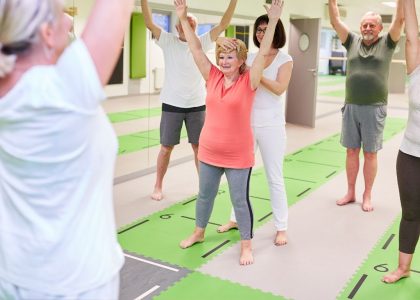Caregivers do many things, like taking their loved ones to the doctor, helping with everyday things, and giving them emotional support. This strong commitment can cause compassion fatigue, which means feeling tired, helpless, and less satisfied from taking care of others.
Caregiving can make you feel worried, sad, and alone. Taking care of someone can be harsh on the body. Caregivers often feel tired and have trouble sleeping, and their muscles can get sore. When these problems are not solved, it causes a harmful cycle – the caregiver’s health worsens, making it harder for them to give good care, making their stress and tiredness even worse.
“Every one of us needs to show how much we care for each other and, in the process, care for ourselves.” — Princess Diana
Taking care of yourself, especially by exercising regularly on your own or with a personal trainer, is crucial for stopping this cycle. By caring for their bodies and minds, caregivers can become stronger and better at handling stress. This can help them provide better care for their loved ones.
Understanding the Impact of Caregiving on Your Well-Being

Caregiving can take a lot of time, make you feel worried, and tire your body. This can cause many health problems, cause many health problems, such as:
⦁ Constant worry and pressure can cause chronic stress, raising cortisol levels and affecting sleep, digestion, and the immune system.
⦁ Feeling tired and worn out: Caregiving can make you feel exhausted and lacking in energy, making it hard for you to do things well.
⦁ “Musculoskeletal issues: Lifting, helping, and moving can make your muscles feel sore and painful. ”
⦁ Long-term stress and not taking care of yourself can make you more likely to get diseases like heart disease, diabetes, and depression.
Why Prioritizing Fitness is Crucial for Caregivers
By making exercise a regular part of your schedule, you’re improving your physical health and your emotional and mental well-being, which can help you be a better caregiver. Here’s how you do it:
⦁ Exercise helps to reduce feelings of stress and anxiety. When you exercise, your body releases feel-good chemicals called endorphins. These make you feel happy and relaxed, and they help reduce stress.
⦁ Exercise makes your brain healthier and your heart stronger, so you have more focus and energy to keep going for longer. This means having more energy to do your daily tasks and spending time with the person you care for.
⦁ Exercise helps you sleep better. It gives your body the rest it needs to work well.
⦁ Building muscles and bones: Regular exercise, like lifting weights, can help you avoid injuries and do daily activities better.
⦁ Regular exercise helps lower the chance of getting sick for a long time. This means you can take care of yourself and your loved ones for a longer time.
Stay Fit Even if You’re Busy

According to the Centers for Disease Control (CDC), about 80% of adult Americans don’t get the suggested amount of weekly exercise. This is particularly alarming considering the recommended amount of weekly exercise is just 2.5 hours. Of those polled, the majority said they were more likely to engage in cardiovascular exercise than resistance training.
In any type of exercise, movement is key, but this does not necessarily need to be ‘gym time‘. The most common reason people give about their lack of weekly exercise is they feel that they do not have enough time. They simply feel like there’s not enough free time in their schedule to go to a gym or local health club.
What they may not realize is increasing your heart rate, stimulating muscles, and burning calories can be achieved without ever setting foot in a gym.
Increase Daily Movement
It can be hard to make time for yourself, but doing little bits of exercise, often referred to as micro workouts, throughout the day contribute to better health. Evidence has been mounting supporting the concept that small, but frequent workouts can contribute greatly to your general health.
Here are some ways to stay healthy and active while taking care of someone else:
Find a Workout that Clicks for You
If you’re new to exercising start with short workouts and slowly make them more intense and longer as you get fitter. Try different exercises until you find the ones you like. This will help you keep doing them. Search YouTube for workouts catered specifically to your goals and fitness level.
If you’re open to joining gym classes most gyms will offer a free trial on classes or a day-rate. Try a wide variety of classes until you find a class and instructor you like.
Add Extra Movement to Your Daily Routine
If diving into a full-fledged workout routine isn’t the least bit appealing to you that’s okay. Instead of joining a gym or signing up for an outdoor fitness boot camp, consider adding some extra movement to your regular routine.

Some examples of how you can add extra movement to your daily routine are:
- Stretch for three minutes when you wake up in the morning
- Do a few squats while brushing your teeth
- Use the stairs instead of the elevator
- Sit on an exercise stability ball at your desk
- Stay in motion while cooking
- Walk to the store if it is close enough
- Park farther away from where you’re going, such as the grocery store
- Do some stretching while waiting for appointments
- Walk or stretch during phone calls
Find a Workout Partner
⦁ Spend time with the person you love by doing physical activities together. Invite loved ones to go walking, doing yoga, exercises, or dancing to music together. You could also consider starting a walking group at work. Invite coworkers to take walks together on your lunch hour or at the end of the work day.
Seek Advice from Your Doctor

Consider talking to your doctor for advice and assistance with safe and sound exercises based on your fitness level and any health problems. Also, consider attending healthcare education classes given by doctors or centers in the community. You can learn about exercise plans for people with the same difficulties as you. Your doctor may also point you in the right direction to join a fitness group in your local area.
Use Fitness Technology
Try fitness apps, online workout videos, or virtual classes that are flexible and convenient. By looking into the latest fitness trends you can easily find out about the latest fitness and training tech available. Fitness technology has never been better at individualizing your training experience and meal planning.
Wrap Up
Don’t forget that taking care of yourself is essential, not selfish. Looking after yourself helps you to take better care of the person you love. By prioritizing fitness, you’ll have the strength and energy to handle the challenging caregiving job with resilience and love.
Always remember that even making small changes can greatly affect how you feel overall. This will help you to keep taking good care of others while also taking care of yourself, which is very important.






